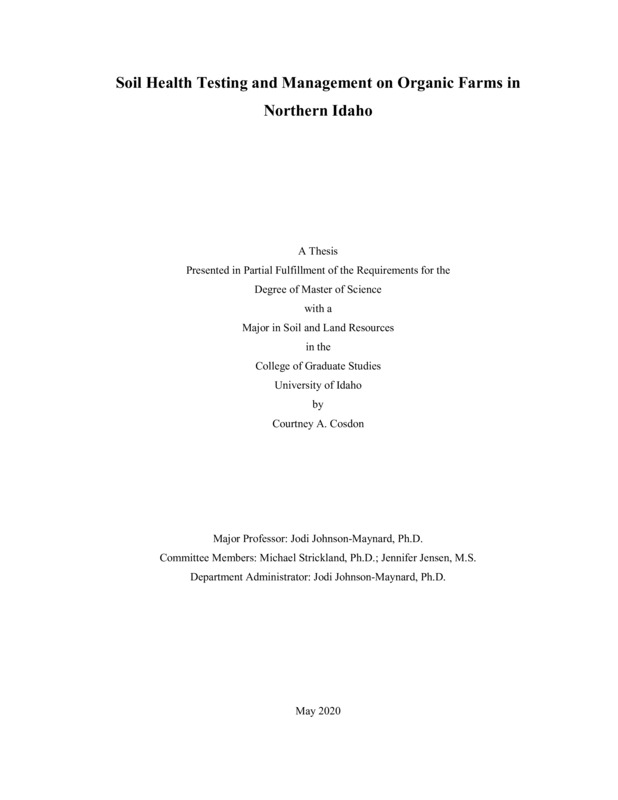Soil Health Testing and Management on Organic Farms in Northern Idaho
Cosdon, Courtney. (2020-05). Soil Health Testing and Management on Organic Farms in Northern Idaho. Theses and Dissertations Collection, University of Idaho Library Digital Collections. https://www.lib.uidaho.edu/digital/etd/items/cosdon_idaho_0089n_11786.html
- Title:
- Soil Health Testing and Management on Organic Farms in Northern Idaho
- Author:
- Cosdon, Courtney
- Date:
- 2020-05
- Keywords:
- Haney Soil Health Test Organic Agriculture Permanganate oxidizable carbon Soil Health Soil Health Testing
- Program:
- Plant, Soil and Entomological Sciences
- Subject Category:
- Soil sciences
- Abstract:
-
In order to build resilience to climate change, increase long-term sustainability of farming operations and decrease the impacts of our current food production system, the concept of soil health has received renewed attention in recent years. Soil is a vital natural resource with the ability to be degraded. Managing for soil health can not only create more sustainable and productive farming systems, but also increase profitability over longer time scales. Benefits of managing for soil health can include decreased soil erosion, more efficient fertilizer use and higher water holding capacity. Despite the benefits of managing for soil health, there is much confusion regarding how to measure it. Traditional soil tests allow farmers to chemically evaluate soils for nutrients, while newer, more integrative soil health testing combines chemical, biological and physical elements to make a more complete analysis. Farmers in northern Idaho and elsewhere are lacking knowledge of how to select appropriate soil health tests, how the results compare to traditional soil fertility tests, and how to interpret and apply the results. This may be especially true for organic growers, since soil health tests have largely been developed and researched on conventionally managed farmground. This project aims to further increase resources regarding testing for soil health and fertility by 1) assessing the relationships among results from traditional soil fertility tests and those of lesser known soil health tests, 2) conducting a survey to determine current soil testing practices in Idaho and barriers for adoption.
The first chapter of this thesis includes research comparing traditional and lesser studied soil health tests including the Haney Soil Health Test (HSHT) and permanganate oxidizable carbon (POxC) at three organic farms in northern Idaho. Three fertilizer application rates were created utilizing plant available nitrogen (N) extracted with 2M KCl (standard fertility test) and H3A (a component of the HSHT). These treatments (KCl and H3A), were compared to a “farmer standard” which simulated how farmers would apply fertilizer without soil testing. Inorganic N extracted by KCl and H3A were comparable (R=0.90, p<0.001) and produced similar fertilizer recommendations and crop yields. Permanganate oxidizable carbon was more closely related to the total pool of carbon (C) and could be utilized as a measurement of long-term C storage. Comparisons of traditional soil fertility tests with newer soil health measurements were similar to results reported in previous studies on conventionally managed farms. The second chapter reports on an online survey focused on soil testing practices and barriers, which was distributed to small acreage farmers throughout the state of Idaho. We found that 63% of respondents are soil testing, which was surprising given that most soil testing research and outreach is conducted on conventionally managed farms. The main barriers for farmers who are not soil testing are cost and time. Both farmers who soil test and those who do not, are interested in learning about and performing soil health testing. While the relatively low response rate somewhat limits our ability to extrapolate to the larger population, these results suggest that both new and more experienced farmers have similar questions about soil health test interpretation and finding soil testing strategies that are catered to organically managed soils. Overall, while many of our test comparisons were similar to results in studies of conventionally managed farms, some were not, raising questions about certain soil health tests and their utility on organically managed farms. We now know there is a need and a desire from organic farmers for better soil health/testing resources which are specifically catered to their management styles.
- Description:
- masters, M.S., Plant, Soil and Entomological Sciences -- University of Idaho - College of Graduate Studies, 2020-05
- Major Professor:
- Johnson-Maynard, Jodi
- Committee:
- Strickland, Mike ; Jensen, Jennifer
- Defense Date:
- 2020-05
- Identifier:
- Cosdon_idaho_0089N_11786
- Type:
- Text
- Format Original:
- Format:
- application/pdf
- Rights:
- In Copyright - Educational Use Permitted. For more information, please contact University of Idaho Library Special Collections and Archives Department at libspec@uidaho.edu.
- Standardized Rights:
- http://rightsstatements.org/vocab/InC-EDU/1.0/

